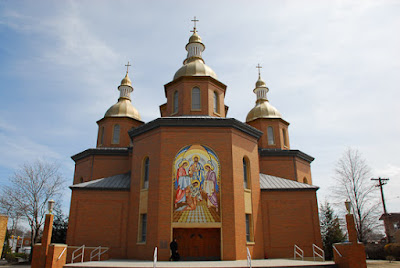In the homily, the priest began by reminding everyone of how the previous week he had talked about the tour of St. Maria Goretti's relics had come through the state. He then told us the story of another young female saint, a Ruthenian Catholic saint who had just been beatified by Pope Francis on October 4, 2014. This was the first time I had ever heard of Blessed Miriam Teresa Demjanovich, and what a lovely example she has given us Catholics in the Church Militant.
 |
| Blessed Miriam Teresa Demjanovich |
The pastor mentioned in his homily that there was a priest by the name of Rev. Benedict Bradley, who often gave talks to the novices at the convent where Blessed Miriam lived every week. He wasn't that great of a writer, so Blessed Miriam would write the catechesis. He later said of her, " “I believed that she enjoyed extraordinary lights, and I knew that she was living an exemplary life…I thought that one day she would be ranked among the saints of God..." This fact wasn't revealed to the convent at large until after her death; and how surprised they were when they found out the erudite and wise words that came from the priest's mouth... were actually from the hand of a 20-something girl from Jersey! Just look at what she had to say on how we can all become saints:
“The saints did one thing: the will of God, but they did it with all their might. We have only to do the same thing; and according to the degree of intensity with which we labor shall our sanctification progress. We shall attain that height of glory in heaven that corresponds to the depths of humility we have sounded on earth. The harder you hit a ball on the ground, the higher it rebounds. The perfection of humility is the annihilation of our will — its absolute submission to the divine in every last detail.”She really reminds me of St. Ignatius of Loyola, my confirmation saint. He saw what the saints did by reading about their lives, and he saw how they ended up; in heaven, that is. Blessed Miriam saw this too, and she speaks very eloquently on the subject. It's been a while since I've been very intrigued to read more on the life of a specific saint and their writings. Perhaps it's because Blessed Miriam is about the same age as me, and from these United States. Perhaps it's because of how she reminds me of St. Ignatius in how she encourages us to be saints by her witness. I'm hoping to read more about her soon, it seems like this would be a good place to start, a collection of the conferences she wrote for Rev. Bradley titled "Greater Perfection". I'm sure there are many more great insights on life such as this in her book:
"Union with God, then, is the spiritual height God calls everyone to achieve – any one, not only religious but any one, who chooses, who wills to seek this pearl of great price, who specializes in the traffic of eternal good, who says 'yes' constantly to God…The imitation of Christ in the lives of saints is always possible and compatible with every state of life."
Her feast day is May 8th. Blessed Miriam Teresa, pray for us!






